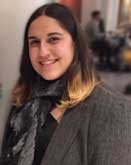Outreach: From the Graduate Student Perspective
By Rachel Henderson
Jessie Micallef is a third-year graduate student at Michigan State University (MSU) getting a dual PhD in Physics and Computational Mathematics, Science, and Engineering. She works on the particle physics experiment IceCube under Professor Tyce DeYoung studying neutrino oscillations. She is both a NSF Graduate Fellow and Intel/SIGHPC computational fellowship recipient.
What experiences do you or your University have involving physics outreach?
I've been part of the Women and Minorities in the Physical Sciences (WaMPS) group since I first got to MSU. It was one of the reasons I wanted to come to MSU, so I made a point to get involved right away. I was elected as First Year Liaison, Vice President, then President in my first three years. WaMPS gets involved in regular outreach, like showing demos at Girls Math and Science Day and other local science festival events. In addition, WaMPS also gets involved deeper with the department community. We run mentoring programs where we assign individual graduate mentors to the REU students in summer and first year grad students in the Fall. I have been a mentor for both of those programs and have made some valuable connections with my mentees. We also make a point to strengthen the physics community within our department. For example, the department asked us to hold a meeting to brainstorm ideas to improve recruiting women and minorities to attend MSU for grad school. Because of WaMPS, I also got involved in planning the 2019 Conference for Undergraduate Women in Physics that is going to be held at MSU. I’ve also participated in multiple workshops that uses movement and dance to teach physics.
How did you get involved in outreach?
In undergrad, I was part of the Society of Women in Physics (SWIP) at University of Michigan. It was a group for undergrads, grads, and faculty who did some really great events, including organizing the Conference for Undergraduate Women in Physics in 2015 and doing yearly outreach with the girl scouts and local middle schools. Once I got to MSU as a grad student, I looked for a similar organization and ended up working with WaMPS. WaMPS does a lot and I really aligned with their core values, so most of the outreach I have done as a graduate student has been through them in some capacity.
What is your favorite part of participating in outreach events?
I really like seeing the effect that outreach has on the students. Whether it is getting young students excited about physics or seeing the graduate student community grow, the results of outreach is the most rewarding part for me. I really like when young students come in, expecting physics to be boring, and we get them super excited about what we're doing. One of my favorite moments was when we built cloud chambers with high school students. When the grad volunteers were practicing building them, we were thrilled to see the particle tracks in the chamber--but this is the science we chose to get a PhD in. It was funny to see the high school students just as excited as us physicists when we showed it to them though. But more than just that excitement, it's knowing that you changed their perspective. You made physics cool and fun. It's similar with mentoring undergrads and even other grads. The best part is seeing them gain confidence and start to recognize that they're going to be able to accomplish their goals. They go from asking questions to having a plan figured out for their future.
As a graduate student, how can the APS Forum on Outreach and Engaging the Public (FOEP) help you become successful with your efforts in physics/astronomy outreach?
WaMPS has a lot of programs, but one thing we recently wanted to start was a seminar series for careers that physicists have gone into, and we were having trouble compiling a list of speakers. I think it would be great if FOEP could compile a list of speakers and outreach groups along with their contact information. It would be helpful for scientists that are beginning an outreach program to have a reference to use to find others that are also involved in similar activities. For example, at MSU we could use this list to bring a speaker in and open it up to the community. I think bridging the gap between the physicists and the public is very important. So I think if FOEP supported us with the resources to easily identify and contact speakers, it would be possible for many groups to take advantage of the list and hold a public lecture series to get their community more excited about physics.
Stay tuned for more perspectives on outreach from other Physics & Astronomy Graduate Students!

Jesse Micallef
